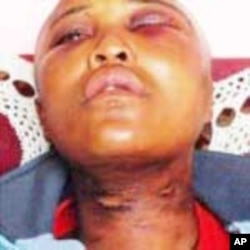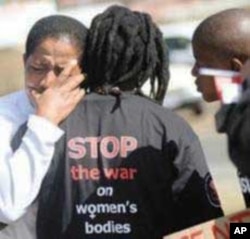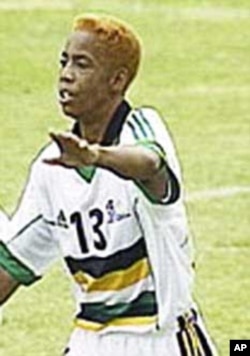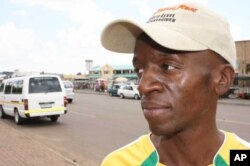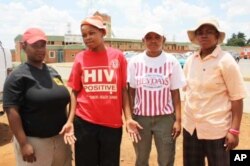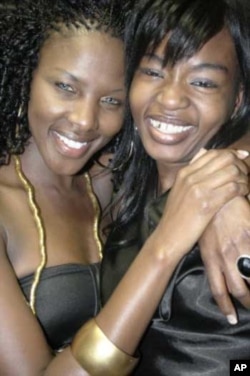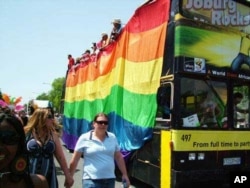Part 4 of a 5 part series: Gays in Africa
1 | 2 | 3 | 4 | 5
Angie Mohoebi sits in the living room of her modest house in Vosloorus, a bleak and smoky township east of Johannesburg, South Africa’s largest city.
“Men come to me on the street all the time,” the young woman says, beneath an almost life-sized poster of deceased pop star Michael Jackson, pasted on the wall. “They laugh in my face and they whisper in my ear, ‘You know baby, we are going to (rape) you good. After that, you will love men.’”
Mohoebi is one of a growing number of South African women choosing to live openly as lesbians. Some are paying a high price for their daring.
Human rights groups say at least 30 women have been murdered in recent years in the country – simply because they were lesbians. Gangs continue to target these women, raping them under the guise of trying to “cure” their sexual orientation.
“This ‘corrective’ rape happens in other parts of the world, but certainly not to the level that it’s happening in South Africa. In some townships here – including Vosloorus – it’s almost become a sport,” says Natasha Vally, of the country’s Lesbian and Gay Equality Project.
Triangle, another local gay rights organization, says it deals with about 10 new incidents of “corrective” rape every week.
The phenomenon gained international attention in 2008, when Eudy Simelane, a former star of South Africa’s women’s national football team, was murdered in Kwa Thema, a township near Vosloorus. Simelane (31) was one of the first women to live openly as a lesbian in the community. A gang of men beat her viciously and took turns raping her, before stabbing her 25 times.
‘I agree with rape’
“When asking why lesbian women are being targeted you have to look at why women are being raped and murdered in such high numbers in South Africa,” says women’s rights activist, Carrie Shelver. “You have to look at the increasingly macho culture, which seeks to oppress women and sees them as merely sexual beings. So when there is a lesbian woman, she is an absolute affront to this kind of masculinity.”
Phumzile Nkosi is a member of the Coalition of African Lesbians and lives in Vosloorus. “Males (here) have got low self esteem, when it comes to lesbians and gays, and we are a big threat – not just a threat, a big one,” she says.
The local lesbians, Nkosi maintains that – unlike the mostly unemployed and “lazy” men of the area – are “go-getters, visible and organized and not ashamed of who we are. This makes the men scared and envious of us.”
Near a shopping center in Vosloorus’s main road, Edward Malumala, wearing a yellow and green T-shirt bearing the image of a smiling Nelson Mandela, says, “These lesbians, they are full of disease. That is why you never see old lesbians, only young ones. They die of disease before they get old.” He adds, “The government must give these lesbians ten years in jail. Then they must be locked with the males. Then they’re going to learn in prison.…”
Outside the Vosloorus community center, Lucky Mpunzi slouches against a wall. He says he’s a painter but can’t find work. Mpunzi says, “Lesbians, they irritate the hell out of me. They walk around here as if they own the place. If there are some guys who rape them, I agree with that, because they are acting inhuman.”
Strict laws, but continuing discrimination
As in other South African townships, rape is the weapon of choice used against lesbians in Vosloorus. “By raping us, their point is that no matter if we prefer to be with women, we will always be females to be used by males,” says Sweeto Makghai.
Her partner, Vania Cruz, comments that some men in Vosloorus regard lesbians as “sexual perverts, freaks, not capable of real emotions and real relationships – like a lower form of life that deserves to be abused.”
Cruz’s friend, Ndondo Nene, says some South African communities refuse to even recognize the abuse of lesbians, and when they do, they say such women “ask for it.”
All this is happening within the context of South Africa having some of the strictest anti-discrimination laws in the world. But, says Vally, the laws aren’t being implemented when it comes to the country’s lesbians.
A recent report by the international NGO ActionAid condemns the “culture of impunity” around crimes against South African lesbians, which it says are “unrecognized by the state and (mostly) unpunished by the legal system.”
Local lesbian activist Melanie Nathan, of the LezGetReal organization, says, “Victims are left to fend for themselves with no resources whatsoever and, worse yet, no protection from perpetrators who continue to live as neighbors of victims and continue to victimize them either psychologically through overt threats or physically again and again and again.…”
Politicians as perpetrators
Cruz is adamant that South Africa’s political leaders must take “a lot of the blame” for the situation. “They ignore us totally!” she says. “They don’t mention our suffering in parliament.”
Nkosi adds, “Some of them actually make our suffering worse.” Last year, then Arts and Culture Minister Lulu Xingwana walked out of an exhibition of photographs – some of black lesbian couples – labeling it “immoral, offensive and going against nation-building.” President Jacob Zuma has also made comments that offended South Africa’s homosexual community.
Makghai laughs, saying, “I believe that there are lesbians and gays in the parliament. The thing is that they don’t want to face the reality. They feel they can’t do this, because they are afraid of losing votes.”
Nkosi says, “They are too cowardly to take a stand, even though by doing that they could save a lot of lives and really improve our lives. Think of the impact that a prominent politician could make by declaring to the nation, ‘I am lesbian.’”
But Nene urges her friends to “forget the politicians” who live in “mansions” far removed from their struggles. “You can’t ask someone who’s in parliament to come and fight my battle here; I am staying here. I think it’s up to us, because the government doesn’t care about us,” she declares.
Nene says lesbians must continue to engage with communities, even the homophobes, “in a respectful way, in a quiet way, to show that we have dignity, to show that we are productive, good members of society. If more heterosexual people start respecting us, they will help us to put pressure on the government to help us.”
Sex education
To end the abuse of lesbians in South Africa, says Cruz, education is paramount. Sex education is part of the country’s school curriculum, but it doesn’t involve telling children about homosexuality. This must change, Cruz says.
“Only by doing that will South Africans from a young age come to see that we are human beings as well,” she says.
But Nkosi reasons that education isn’t a panacea. “When children go home (from school), there is culture. Parents will tell them, ‘In my house, we are Zulus, or Venda or Xhosas. We don’t do such a thing; there are no gays and lesbians in our culture.”
Nkosi points out that homophobia is present in the white suburbs…but not to the extent that it is in the black townships. “White people do talk about any type of an issue. In black communities, serious issues – they don’t talk about it,” she says.
Cruz adds, “We don’t even talk about sex here in South Africa in the townships, yet we have the most HIV infections in the world. The big problem with our African culture is that people think that by not talking about a problem, that problem will just go away. Yet that is a recipe to make the problem even worse.”
According to human rights organizations, this is exactly what’s happening in South Africa.
But Nkosi isn’t fazed. She says if – “God forbid” – she is ever targeted for “corrective” rape by “some monster,” she will stand up afterwards and “tell the world – he can rape you, he can abuse you, he can kill you; he can do anything…(but) you will always remain who you are.”




